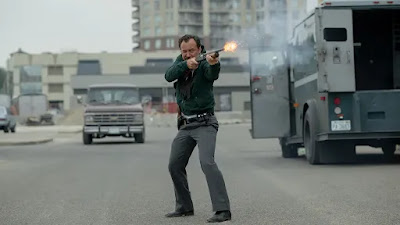Kurzel himself is doing little revolutionary here, beyond keeping his eyes and ears open at every turn. Yet even that much distinguishes him from that MBA class of producer-directors who shoot everything green screen for reasons of efficiency, and to further their ambitions to make money rather than art. By contrast, working closely once more with the gifted cinematographer Adam Arkapaw, Kurzel frames this backwater much as he did the Outback in earlier films, allowing us to register both the space that allows Mathews' antagonists to disappear into the hills between cashgrabs, and the quiet hum of violence left behind in their wake; one reason The Order grips as it does is that we know this director isn't one to look away whenever things get fraught. There's certainly action to behold here - scrappy Don Siegel gunfights, and one sequence that demonstrates everything this filmmaker learnt on the Ned Kelly movie - yet Kurzel also underlines his already strong claim to being an actor's director, casting attentively, and then eliciting the scene-by-scene effects that enable this story to gather the momentum it does. Law, improving with every decade of work, sketches a flatfoot put out to pasture and trying to pull himself together on the hoof; for the first time, the actor's hairline tesselates perfectly with the role. The still underrated Hoult, meanwhile, does something very different from his conscience-stricken Juror #2, combining a cult leader's charisma with a tendency to go horribly dead behind the eyes at critical moments, like a cross between the young Tom Cruise and Manson; and there are characterful contributions from Tye Sheridan as a fresh-faced deputy, Marc Maron as a Jewish radio DJ the bigots target, and Alison Oliver and Odessa Young as the women in Bob's life. The framework Baylin sets in place remains inescapably generic, but what matters is the very raw material Kurzel and these performers work into individual scenes and moments: the frayed nerves and sore spots, the simmering aggression, the underlying grievances that lend themselves to being whipped up and weaponised. Having slipped largely unnoticed through successive lists of nominations, The Order now occupies an odd cultural space, sent out to compete for screens with Robbie Williams' chimp biopic and the Wicked singalong, yet its haunted, wounded, ominously febrile atmosphere ensures Kurzel's film feels more in touch with America as we leave it at the end of 2024 than most of the season's major awards contenders.
The Order opens in selected cinemas from Friday.

No comments:
Post a Comment